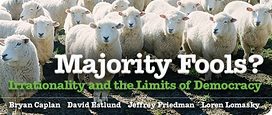In his original reply, Jeff faulted me for failing to pay attention to how people actually form beliefs and fall into error. But now he’s switched to the much stronger claim that the very idea of irrationality is somehow philosophically incoherent:
To call people’s emotional attachment to religious beliefs irrational, then Caplan has to assume that these beliefs are incorrect—and that the religious believers know that they’re incorrect.
[…]
Nobody needs an incentive to believe in what he thinks is true; believing in what one thinks is true is simply coextensive with believing anything, period. Conversely, even perverse incentives can’t explain perverse beliefs, because the very notion of “perverse beliefs” is self-contradictory, despite its popularity (and the popularity of the twin notion of “willful ignorance”). There are plenty of false beliefs, but nobody can “believe” to be true what he knows is false. Therefore, false beliefs must be unwittingly false.
So, Jeff, how would you classify the beliefs of someone who hastily and uncritically accepts conclusions that he would like to be true, but skeptically resists conclusions that he would like to be false? This isn’t literally a case of believing what you know to be false. But it is a case of relaxing intellectual discipline to get to the beliefs you’d like to have. I think that’s enough to qualify as “perverse belief,” “willful ignorance,” or “irrationality.” Why don’t you?

